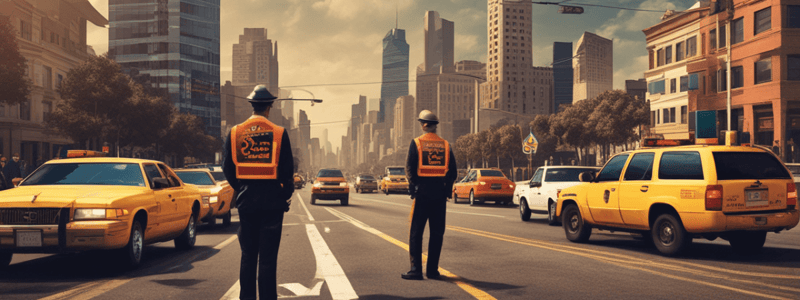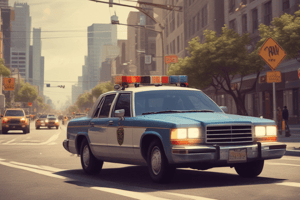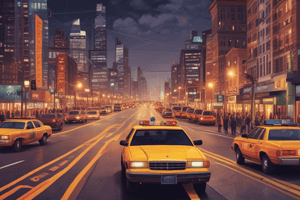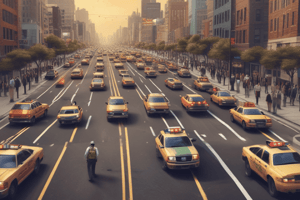Podcast
Questions and Answers
What is the primary purpose of a whistle in traffic control?
What is the primary purpose of a whistle in traffic control?
- To alert pedestrians of an intersection
- To signal stops and goes to motorists (correct)
- To communicate with other officers
- To signal the start of a traffic investigation
What is the main responsibility of a traffic direction officer in an emergency situation?
What is the main responsibility of a traffic direction officer in an emergency situation?
- To clear one lane for emergency vehicles (correct)
- To block all intersections in the area
- To direct traffic around an accident scene
- To assist pedestrians in crossing the road
What type of clothing is recommended for a traffic control officer?
What type of clothing is recommended for a traffic control officer?
- Reflective clothing
- High visibility clothing (correct)
- Formal uniform
- Weather-resistant clothing
What is the purpose of the electric signal box in traffic control?
What is the purpose of the electric signal box in traffic control?
What signal does an officer use to indicate STOP to motorists?
What signal does an officer use to indicate STOP to motorists?
What is the purpose of channeling traffic in emergency situations?
What is the purpose of channeling traffic in emergency situations?
What is the primary consideration when positioning oneself in a roadway for traffic control?
What is the primary consideration when positioning oneself in a roadway for traffic control?
What is the purpose of a traffic direction officer in a non-emergency situation?
What is the purpose of a traffic direction officer in a non-emergency situation?
What is the advantage of using plastic whistles in traffic control?
What is the advantage of using plastic whistles in traffic control?
What is the purpose of a yellow box on a corner in traffic control?
What is the purpose of a yellow box on a corner in traffic control?
What is the purpose of using flashers in traffic control?
What is the purpose of using flashers in traffic control?
What is the purpose of using railroad type fuses or flares in traffic control?
What is the purpose of using railroad type fuses or flares in traffic control?
Flashcards are hidden until you start studying
Study Notes
Effective Traffic Control
- Proper clothing includes high visibility clothing, proper lighting (e.g., orange wand), and general clothing for different weather conditions (rain, cold, hot)
- Position in roadway: evaluate the intersection, command a full view of the intersection, and may require more than one officer
Signals and Gestures
- Signals: front and back of officer means STOP
- Gestures: clear movement of arms, eye contact is a must, arm out with palm out to indicate STOP
- Whistle: a must-have item, plastic is the best material, attach to coat or shirt, use one loud long blast for STOP and two loud short blasts for GO
Responsibilities of Traffic Direction
- Eliminate blocked intersections
- Assist turns
- Protect pedestrians
- Ensure clear lanes for emergency vehicles
Electric Signal Box
- Yellow box on corner
- Try hand direction before using the box
- Switches: on/off reset circuit breakers
- Flashers: automatic to manual (hand button)
Emergency Traffic Control
- Use police vehicle and equipment to block intersection and detour traffic
- Channeling traffic: move from greater lanes to lesser lanes
- Freeway traffic: high visibility, relevant emergency equipment, and number of officers needed and where
Warning Devices
- Railroad type fuses (flares): most dangerous when igniting (strike away from body)
- Flares do not need to be upright for visibility, do not step on them to put out, and rub out in earth when finished
Placing Warning Devices
- Start from behind the scene and work toward traffic
- Never turn your back on traffic
- Place flares 20-25 feet apart near the scene, gradually increasing distance farther from the scene
- Consider speed of traffic for the number of flares used (e.g., 60mph equals 90 ft./second)
- Curves: place flares to warn traffic approaching
- Hills: place flares before the crest
Effective Traffic Control
- Proper clothing includes high visibility clothing, proper lighting (e.g., orange wand), and general clothing for different weather conditions (rain, cold, hot)
- Position in roadway: evaluate the intersection, command a full view of the intersection, and may require more than one officer
Signals and Gestures
- Signals: front and back of officer means STOP
- Gestures: clear movement of arms, eye contact is a must, arm out with palm out to indicate STOP
- Whistle: a must-have item, plastic is the best material, attach to coat or shirt, use one loud long blast for STOP and two loud short blasts for GO
Responsibilities of Traffic Direction
- Eliminate blocked intersections
- Assist turns
- Protect pedestrians
- Ensure clear lanes for emergency vehicles
Electric Signal Box
- Yellow box on corner
- Try hand direction before using the box
- Switches: on/off reset circuit breakers
- Flashers: automatic to manual (hand button)
Emergency Traffic Control
- Use police vehicle and equipment to block intersection and detour traffic
- Channeling traffic: move from greater lanes to lesser lanes
- Freeway traffic: high visibility, relevant emergency equipment, and number of officers needed and where
Warning Devices
- Railroad type fuses (flares): most dangerous when igniting (strike away from body)
- Flares do not need to be upright for visibility, do not step on them to put out, and rub out in earth when finished
Placing Warning Devices
- Start from behind the scene and work toward traffic
- Never turn your back on traffic
- Place flares 20-25 feet apart near the scene, gradually increasing distance farther from the scene
- Consider speed of traffic for the number of flares used (e.g., 60mph equals 90 ft./second)
- Curves: place flares to warn traffic approaching
- Hills: place flares before the crest
Studying That Suits You
Use AI to generate personalized quizzes and flashcards to suit your learning preferences.




